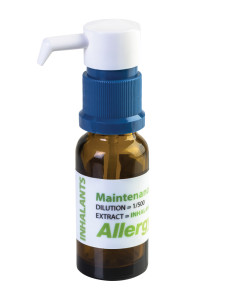 With spring in the air, some people are seeking out antihistamines or corticosteroids to tide them through allergy season.
With spring in the air, some people are seeking out antihistamines or corticosteroids to tide them through allergy season.
These work fairly well for some patients, but for others, allergy immunotherapy (delivered through allergy shots or oral drops) can provide more thorough, lasting relief. It’s important to think about the severity and duration of your symptoms when considering immunotherapy.
- Severity. If you rank your symptoms as a 5 out of 5 on a misery scale, your allergies may be severe enough for immunotherapy.
- Duration. It’s a red flag, too, if your symptoms last for multiple months. For example, if you are close to a 5 on the misery scale in spring and fall, and in moderate discomfort during other parts of the year, consider seeing a doctor about immunotherapy. Pills may be appropriate for short symptom bursts, but immunotherapy is often better for symptoms lasting more than four months per year.
Getting Started with Treatment
Allergy immunotherapy presents some significant advantages over simply popping an allergy pill. First, immunotherapy is the only treatment proven to change the underlying allergic disease, not just its symptoms. Also, immunotherapy is nature-based and free of the side effects of synthetic medications.
Allergy Testing
To determine if immunotherapy is right for you, your physician may administer an allergy test (usually a blood test or skin scratch or prick test). Since tests are prone to false negatives and other inaccuracies, your doctor also will consider your symptoms and health history.
Immunotherapy
Immunotherapy starts with an allergy serum, which contains traces of common pollens mixed into a saline solution. As your body is exposed to these pollens, it develops an immunity to them. So, it will stop overreacting every time it encounters them in nature.
Shot-Free Alternatives
For many years, immunotherapy was administered only through injections. Patients had to drive to the doctor’s office a couple times a week for shots. More options are now available. Most of my patients prefer sublingual (under-the-tongue) allergy drops because they are safer than shots and can be taken at home. The drops absorb into the bloodstream through cells in the mouth.
Allergy drops often are a great choice for kids. Because of their safety profile, they can be given to younger children as opposed to shots.
Talk to a physician if you think you may be a candidate for immunotherapy. Medications provide temporary relief, but immunotherapy can provide a lasting solution.
Stuart H. Agren, MD, opened the Family Allergy Clinic in the East Valley in 1985. He has helped more than 15,000 patients overcome food and pollen allergies using sublingual allergy drops. Peers recently chose him as a Phoenix Magazine Top Doc. His offices can be reached at (480) 827-9945. Visit the website at FamilyAllergyClinic.com.

